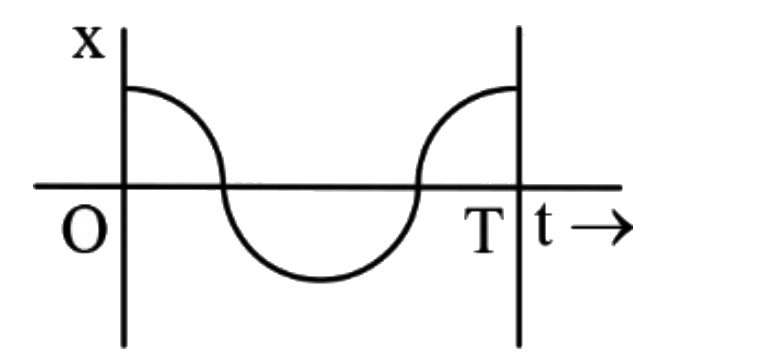A body is performing simple harmonic motion. Then its
average total energy per cycle is equal to its maximum kinetic energy.
average kinetic energy per cycle is equal to half of its maximum kinetic energy.
average total energy per cycle is equal to half of its malximum kinetic energy.
None of these.
The correct Answer is:B
When a body performs S.H.M. total energy of the body remain constant and kinetic energy of the body is maximum at mean position its maximum value is equal to total oscillation energy of the body .Hence average total oscilation energy per cycle is equal its the maximum K.E. of the body hence (a) is connect Obviously (c) is wrong
If amplitude of oscillations is equal to a and angular frequency is to then maximum velocity of the body will be equal to a as and it varius according to sine over a completed cycle will be equal to 1√2aω
Avarage K.E.=12mv2max=14ma2aω
which is half of maximum K.E.
Topper's Solved these Questions
- OSCILLATION AND SIMPLE HARMONIC MOTIONBook:A2ZChapter:OSCILLATION AND SIMPLE HARMONIC MOTIONExercise:Spring Particle System
Explore 24 Videos
- OSCILLATION AND SIMPLE HARMONIC MOTIONBook:A2ZChapter:OSCILLATION AND SIMPLE HARMONIC MOTIONExercise:Simple Pendulum And Different Cases Of Shm
Explore 25 Videos
- OSCILLATION AND SIMPLE HARMONIC MOTIONBook:A2ZChapter:OSCILLATION AND SIMPLE HARMONIC MOTIONExercise:Chapter Test
Explore 29 Videos
- NEWTONS LAWS OF MOTIONBook:A2ZChapter:NEWTONS LAWS OF MOTIONExercise:Chapter Test
Explore 30 Videos
- PROPERTIES OF MATTERBook:A2ZChapter:PROPERTIES OF MATTERExercise:Chapter Test
Explore 29 Videos
Similar Questions
Knowledge Check
In simple harmonic motion
APotential energy and kinetic energy may not be equal in mean position.Bpotential energy and kinetic energy may be equal in extreme positionCpotential energy may be zero at extreme positionDkinetic energy plus potential energy oscillates simple harmonically.In a simple harmonic motion
Athe potential energy is always equal to the kinetic energyBthe potential energy of is never equal to the kinetic energyCthe average potential energy in any time interval is equal to the average kinetic energy in that time intervalDthe average potential energy is one time period is equal to the averge energy is this periodIn a simple harmonic motion
Athe maximum potential energy equals the maximum kinetic energyBthe minimum potential energy equals the minimum kinetic energyCthe minimum potential energy equals the maximum kinetic energyDthe maximum potential energy equals the minimum kinetic energy.
A body is performing simple harmonic motion of amplitude A and time period T. The figure shown position-time graph of the body . At any time t, acceleration of the body is f, then which of the following graphs is/are appropriate?

View SolutionA body is performing simple harmonic motion with amplitude A and time period T variation of its acceleration (f) with time(t) is shown in figure If a line x velocity of the body is x which of the following graph is correct?

View SolutionThe velocity of a particle performing simple harmonic motion, when it passes through its mean position i
View SolutionA mass M is performing linear simple harmonic motion. Then correct graph for acceleration a and corresponding linear velocity v is
View SolutionA particle is performing simple harmonic motion with amplitude A and angular velocity ω . The ratio of maximum velocity to maximum acceleration is
View Solution
